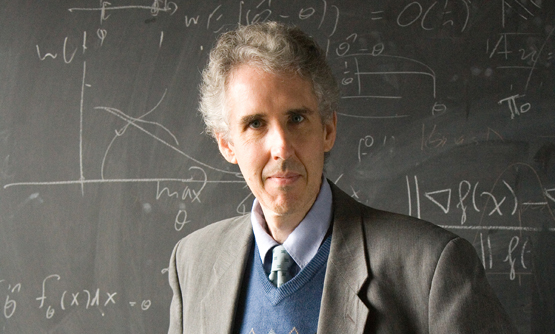Alfred O. Hero, III named John H. Holland Distinguished University Professor of EECS

 Enlarge
Enlarge
Alfred O. Hero, III, R. Jamison and Betty Williams Professor of Engineering, has been named the John H. Holland Distinguished University Professor of Electrical Engineering and Computer Science in acknowledgement of his extraordinary accomplishments that have brought distinction to himself, his students, and to the entire University.
The Distinguished University Professorship, established in 1947, recognizes professors for exceptional scholarly or creative achievement, national and international reputation, and superior teaching skills. Faculty are given the opportunity to determine the name of the professorship.
“I chose to name my DUP after John Holland as someone whose intellectual qualities have inspired me throughout my career,” said Prof. Hero. “He was a deep thinker who did not adhere to scientific dogma and who circulated freely across disciplinary boundaries. He helped develop the field of complex adaptive systems that has had broad reaching impact and has intersected with my own research in adaptive signal processing, statistical machine learning and complex networks.”
Prof. Hero is an internationally recognized expert in the field of signal and image processing. His recent research interests are data science, bioinformatics and personalized health, statistical signal processing and imaging, correlation mining, statistical machine learning and pattern recognition, wearable wireless sensors, sensor networks, and sensor management.
With his group, Al builds foundational theory and methodology for data science and engineering. Their projects develop theory and algorithms for data collection, analysis, and visualization that use statistical machine learning and distributed optimization. These findings are then applied to a variety of problems, including network data analysis, personalized health, data-driven physical simulation, materials science, dynamic social media, and database indexing and retrieval.
Prof. Hero thrives in the interdisciplinary and cross-disciplinary interactions that define his approach to research. “While we may solve a specific problem related to economic forecasting or networking,” stated Prof. Hero, “this same research can be extended to gaining environmental insights from tree-rings, or earthquake activity.” And more recently – to the exploding field of data science.
In 2015, Prof. Hero was named Co-Director of the Michigan Institute for Data Science (MIDAS). His stated goal as director is “to help move the extraordinary and diverse activities happening in the field of data science at Michigan into a more coordinated focus. I want to enhance the data science community in terms of collaboration (which has always been of tremendous value in my own research), access to resources, and the identification of new directions for funding with the goal of improving the overall scientific enterprise.”
In addition to his primary appointment in the Department of Electrical Engineering and Computer Science, he holds appointments in the Department of Biomedical Engineering and the Department of Statistics, and is affiliated with the Center for Computational Medicine and Bioinformatics (CCMB) and the Graduate Program in Applied and Interdisciplinary Mathematics (AIM).
An outstanding leader in his profession, Al is slated to be general co-chair of the 2019 IEEE International Symposium on Information Theory, and is general co-chair of the 2016 National Academies Workshop on Refining the Concept of Scientific Interference when Working with Big Data. In the past, he has served on the Board of Directors of IEEE (2009-2011) as Director of Division IX (Signals and Applications), and he served as President of the IEEE Signal Processing Society (2006-07). From 2008 to 2013 he held the Digiteo Chaire d’Excellence at the Ecole Superieure d’Electricite in France. He is a member of the Big Data Special Interest Group (SIG) of the IEEE Signal Processing Society, and since 2011 he has been a member of the Committee on Applied and Theoretical Statistics (CATS) of the U.S. National Academies of Science. He has served on the editorial boards of the IEEE Transactions on Information Theory (1995-1998, 1999), the IEEE Transactions on Computational Biology and Bioinformatics (2004-2006), and the IEEE Transactions on Signal Processing (2002, 2004). He is a member of numerous committees of the National Academy of Sciences.
Prof. Hero has received numerous best paper awards, including an IEEE Signal Processing Society Best Paper Award (1998), a Best Original Paper Award from the Journal of Flow Cytometry (2008), a Best Magazine Paper Award from the IEEE Signal Processing Society (2010), a SPIE Best Student Paper Award (2011), an IEEE ICASSP Best Student Paper Award (2011), an AISTATS Notable Paper Award (2013), and an IEEE ICIP Best Paper Award (2013).
He co-authored the textbook, Foundations and Applications of Sensor Management in 2008, and is co-editor of the book Big Data Over Networks (2016). Prof. Hero has published approx. 600 journal and conference papers, has 4 patents, and is a Fellow of IEEE. He has graduated over 50 doctoral students and mentored over 25 postdocs, many of whom are now in academic positions and prestigious research labs. Throughout his career, he has taught twelve different courses, ranging from sophomore to doctoral level.
Prof. Hero will present a special lecture in the coming year in honor of being named the John H. Holland Distinguished University Professor of Electrical Engineering and Computer Science.
 John Holland (1929-2015) was a pioneer in the study of complex adaptive systems and the leading figure in what became known as genetic algorithms.
John Holland (1929-2015) was a pioneer in the study of complex adaptive systems and the leading figure in what became known as genetic algorithms.
He received his bachelor’s degree in physics from the Massachusetts Institute of Technology, and his master’s and PhD degrees in mathematics and communication sciences, respectively, from the University of Michigan. He was the first individual to receive a Ph.D. in computer sicence at Michigan, and was one of the first faculty members of the former Department of Computer and Communication Sciences (CCS), which later merged with the Department of Electrical Engineering and Computer Science in 1984. He was also a professor of psychology.
In 1975, Prof. Holland published the groundbreaking book Adaptation in Natural and Artificial Systems, which has been cited more than 50,000 times and has been published in several languages. This book initiated the field of genetic algorithms and their role in studies of adaptive complex systems. He wrote several subsequent books, including Induction (1989), Hidden Order: How Adaptation Builds Complexity(1995), Emergence: From Chaos to Order (1998), Signals and Boundaries: Building Blocks for Complex Adaptive Systems (2012), and Complexity: A Very Short Introduction (2014),
Prof. Holland co-founded and led the U-M Center for the Study of Complex Systems at Michigan. He was one of the earliest members of the Santa Fe Institute, where leading scientists of various disciplines, universities, agencies, and companies grapple with some of the most compelling and complex problems of our time. He was a MacArthur fellow and a fellow of the World Economic Forum.
More Info
Complexity scient giant John Holland passes away at 86, Santa Fe Institute, August 10, 2015
John Henry Holland, Who Computerized Evolution, Dies at 86, The New York Times (August 20, 2015)
Goodbye to the genius who changed the way we think (and you didn’t even know it), The Washington Post (August 19, 2015, written by SFI External Professor Scott Page)
Computer Science Pioneer Dies, in The Scientist (August 21, 2015)
Obituary: John Henry Holland, The University Record (August 14, 2015)
John Holland Dies, National Center for Science Education (August 11, 2015)
 MENU
MENU 
